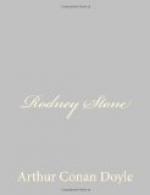Belcher and Baldwin had pounced upon their man, and had him up and in his corner in an instant, but, in spite of the coolness with which the hardy smith took his punishment, there was immense exultation amongst the west-countrymen.
“We’ve got him! He’s beat! He’s beat!” shouted the two Jew seconds. “It’s a hundred to a tizzy on Gloucester!”
“Beat, is he?” answered Belcher. “You’ll need to rent this field before you can beat him, for he’ll stand a month of that kind of fly-flappin’.” He was swinging a towel in front of Harrison as he spoke, whilst Baldwin mopped him with the sponge.
“How is it with you, Harrison?” asked my uncle.
“Hearty as a buck, sir. It’s as right as the day.”
The cheery answer came with so merry a ring that the clouds cleared from my uncle’s face.
“You should recommend your man to lead more, Tregellis,” said Sir John Lade. “He’ll never win it unless he leads.”
“He knows more about the game than you or I do, Lade. I’ll let him take his own way.”
“The betting is three to one against him now,” said a gentleman, whose grizzled moustache showed that he was an officer of the late war.
“Very true, General Fitzpatrick. But you’ll observe that it is the raw young bloods who are giving the odds, and the Sheenies who are taking them. I still stick to my opinion.”
The two men came briskly up to the scratch at the call of time, the smith a little lumpy on one side of his head, but with the same good-humoured and yet menacing smile upon his lips. As to Wilson, he was exactly as he had begun in appearance, but twice I saw him close his lips sharply as if he were in a sudden spasm of pain, and the blotches over his ribs were darkening from scarlet to a sullen purple. He held his guard somewhat lower to screen this vulnerable point, and he danced round his opponent with a lightness which showed that his wind had not been impaired by the body-blows, whilst the smith still adopted the impassive tactics with which he had commenced.
Many rumours had come up to us from the west as to Crab Wilson’s fine science and the quickness of his hitting, but the truth surpassed what had been expected of him. In this round and the two which followed he showed a swiftness and accuracy which old ringsiders declared that Mendoza in his prime had never surpassed. He was in and out like lightning, and his blows were heard and felt rather than seen. But Harrison still took them all with the same dogged smile, occasionally getting in a hard body-blow in return, for his adversary’s height and his position combined to keep his face out of danger. At the end of the fifth round the odds were four to one, and the west-countrymen were riotous in their exultation.
“What think you now?” cried the west-countryman behind me, and in his excitement he could get no further save to repeat over and over again, “What think you now?” When in the sixth round the smith was peppered twice without getting in a counter, and had the worst of the fall as well, the fellow became inarticulate altogether, and could only huzza wildly in his delight. Sir Lothian Hume was smiling and nodding his head, whilst my uncle was coldly impassive, though I was sure that his heart was as heavy as mine.




